Related Research Articles

John Hume was an Irish nationalist politician in Northern Ireland and a Nobel Peace Prize laureate. A founder and leader of the Social Democratic and Labour Party,Hume served in the Parliament of Northern Ireland;the Northern Ireland Assembly including,in 1974,its first power-sharing executive;the European Parliament and the United Kingdom Parliament. Seeking an accommodation between Irish nationalism and Ulster unionism,and soliciting American support,he was both critical of British government policy in Northern Ireland and opposed to the republican embrace of "armed struggle". In their 1998 citation,the Norwegian Nobel Committee recognised Hume as an architect of the Good Friday Agreement. For himself,Hume wished to be remembered as having been,in his earlier years,a pioneer of the credit union movement.
The Nationalist Party was a term commonly used to describe a number of parliamentary political parties and constituency organisations supportive of Home Rule for Ireland from 1874 to 1922. It was also the name of the main Irish nationalist Nationalist Party in Northern Ireland from 1921 to 1978.
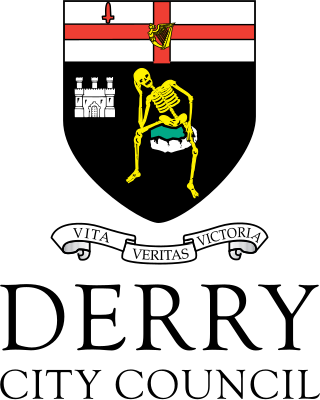
Derry City Council was the local government authority for the city of Derry in Northern Ireland. It merged with Strabane District Council in April 2015 under local government reorganisation to become Derry and Strabane District Council.
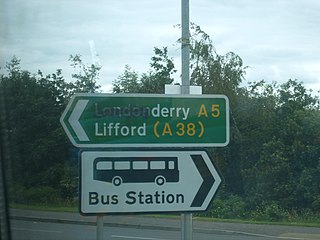
The names of the city and county of Derry or Londonderry in Northern Ireland are the subject of a naming dispute between Irish nationalists and unionists. Generally,although not always,nationalists favour using the name Derry,and unionists Londonderry. Legally,the city and county are called "Londonderry",while the local government district containing the city is called "Derry City and Strabane". The naming debate became particularly politicised at the outset of the Troubles,with the mention of either name acting as a shibboleth used to associate the speaker with one of Northern Ireland's two main communities. The district of Derry and Strabane was created in 2015,subsuming a district created in 1973 with the name "Londonderry",which changed to "Derry" in 1984.

Free Derry was a self-declared autonomous Irish nationalist area of Derry,Northern Ireland that existed between 1969 and 1972 during the Troubles. It emerged during the Northern Ireland civil rights movement,which sought to end discrimination against the Irish Catholic/nationalist minority by the Protestant/unionist government. The civil rights movement highlighted the sectarianism and police brutality of the overwhelmingly Protestant police force,the Royal Ulster Constabulary (RUC).
Ivan Averill Cooper was a nationalist politician from Northern Ireland. He was a member of the Parliament of Northern Ireland and a founding member of the Social Democratic and Labour Party (SDLP). He is best known for leading the civil rights march on 30 January 1972 that developed into the Bloody Sunday massacre.
The Irish Independence Party (IIP) was a nationalist political party in Northern Ireland,founded in October 1977 by Frank McManus and Fergus McAteer. The party was effectively a merger of Unity and the Nationalist Party,as the bulk of activists and councillors from the two movements joined IIP. However several independent councillors also joined the party. It was boosted in the late 1970s by the defection of a prominent Protestant Larne Social Democratic and Labour Party (SDLP) councillor,John Turnley,later the party chairman,who was killed in 1980 in Carnlough,County Antrim,by an attack claimed by the Ulster Defence Association.
The Irish Anti-Partition League (APL) was a political organisation based in Northern Ireland which campaigned for a united Ireland from 1945 to 1958. The organisation aimed to unite Irish nationalists,filling the void left by nationalist groups that had become inactive in the decade prior. At its peak,the League had around 3,500 members. There was significant internal debate about whether candidates should participate in the British Parliament. In the mid-1950s,most abstentionists had left the organisation. Dwindling membership meant that by 1956,no candidates were nominated for committee elections. The organisation remained inactive until 1958,when a final meeting was held to distribute remaining funds. The League was succeeded by National Unity in 1959.

Edward Gerard McAteer was an Irish nationalist politician from Northern Ireland. He was born in Coatbridge,Scotland,to Hugh McAteer and Brigid McAteer. McAteer's family moved to Derry in Northern Ireland while he was young. In 1930 he joined the Inland Revenue,where he worked until 1944. He then became an accountant and more actively involved in politics. While his brother,Hugh,became a prominent Irish republican in the Irish Republican Army (IRA) and Sinn Féin,Eddie chose constitutional nationalist politics. He was elected as the Nationalist Party Member of Parliament for Mid Londonderry in the 1945 Northern Ireland general election. He was co-founder of the Irish Anti-Partition League,founded in 1946,and became its vice chairman in 1947,then its chairman in 1953.
The Nationalist Party was the continuation of the Irish Parliamentary Party (IPP),and was formed after the partition of Ireland,by the Northern Ireland-based members of the IPP.
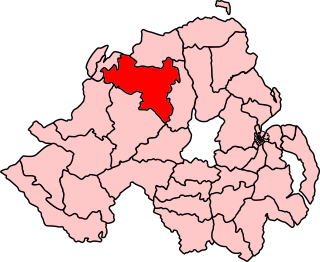
Mid Londonderry was a county constituency comprising the central part of County Londonderry. It was created in 1929,when the House of Commons Act 1929 introduced first-past-the-post elections throughout Northern Ireland. It was one of five single-member constituencies replacing the former five-member Londonderry constituency. The constituency survived unchanged,returning one member of Parliament until the Parliament of Northern Ireland was temporarily suspended in 1972,and then formally abolished in 1973.
Raymond McClean was an Irish nationalist politician and physician from Northern Ireland.
Michael Canavan is a former Irish nationalist business owner and politician.
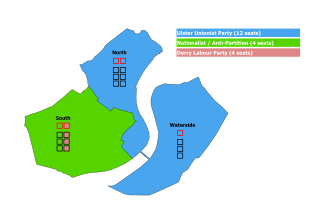
Elections to Londonderry Borough Council were held on 16 October 1946. The Ulster Unionist Party (UUP) retained their majority with Sir Basil McFarland continuing as Mayor of Londonderry. The elections were postponed from the original February date due to an unusually large number of objections to the list of electors.
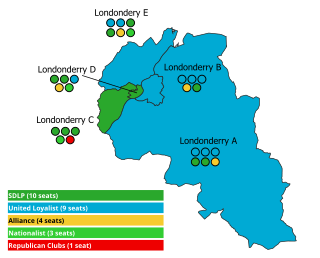
The 1973 Londonderry City Council election took place on 30 May 1973 to elect members of Londonderry City Council in Northern Ireland. This was on the same day as other Northern Irish local elections. The campaign was significant in that,following changes to the election process and districts,Irish nationalist parties were able to take control of the council for the first time.
Elections to Londonderry City Council were held on 20 May 1981 on the same day as the other Northern Irish local government elections. The election used five district electoral areas to elect a total of 27 councillors.
Elections to Fermanagh District Council,in Northern Ireland,were held on 20 May 1981,the same day as the other Northern Irish local government elections. The election used five district electoral areas to elect a total of 20 councillors.
Londonderry Area C,called Derry Area C from 1984,was one of the five district electoral areas in Derry,Northern Ireland which existed from 1973 to 1985. The district elected five members to Londonderry City Council,and formed part of the Londonderry constituencies for the Northern Ireland Assembly and UK Parliament.
Londonderry Area D,called Derry Area D from 1984,was one of the five district electoral areas in Derry,Northern Ireland which existed from 1973 to 1985. The district elected five members to Londonderry City Council,and formed part of the Londonderry constituencies for the Northern Ireland Assembly and UK Parliament.
Londonderry Area E,called Derry Area B from 1984,was one of the five district electoral areas in Derry,Northern Ireland which existed from 1973 to 1985. The district elected six members to Londonderry City Council,and formed part of the Londonderry constituencies for the Northern Ireland Assembly and UK Parliament.
References
- ↑ "MCATEER, Fergus". Companies House. UK Government. Retrieved 21 January 2025.
- ↑ "Bloody Sunday Enquiry Transcript - Day 168". Archived from the original on 27 September 2007. Retrieved 21 May 2007.
- 1 2 "The Local Government Elections 1973-1981: Derry". Archived from the original on 23 September 2015. Retrieved 21 May 2007.
- ↑ "Abstracts on Organisations - 'I'". Archived from the original on 6 December 2010. Retrieved 21 May 2007.
- ↑ "Londonderry 1973-1982". Archived from the original on 30 September 2007. Retrieved 21 May 2007.
- ↑ 1985 council election results Archived 21 July 2011 at the Wayback Machine
- ↑ "Local Government Elections 1985 -1989: Derry". Archived from the original on 6 June 2007. Retrieved 21 May 2007.
- ↑ Fergus McAteer & Co Archived 10 October 2007 at the Wayback Machine